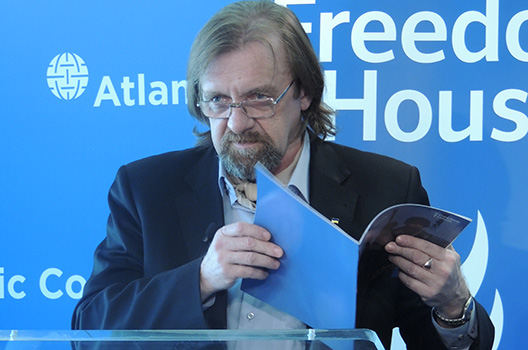 On March 6, the Atlantic Council’s Dinu Patriciu Eurasia Center hosted a panel discussion introducing a report Human Rights Abuses in Russian-Occupied Crimea, by Andrii Klymenko. The report chronicles how in one year of occupation, the Russian authorities have established a repressive system of control aimed at suppressing and intimidating “disloyal” groups. Rather than protecting Russians — as President Putin claims to do — his government is actively violating their, and other groups, basic human rights.
On March 6, the Atlantic Council’s Dinu Patriciu Eurasia Center hosted a panel discussion introducing a report Human Rights Abuses in Russian-Occupied Crimea, by Andrii Klymenko. The report chronicles how in one year of occupation, the Russian authorities have established a repressive system of control aimed at suppressing and intimidating “disloyal” groups. Rather than protecting Russians — as President Putin claims to do — his government is actively violating their, and other groups, basic human rights.
Klymenko outlined how human rights violations are part of everyday life in Crimea: residents have been forced to accept Russian citizenship, many have had their property illegally expropriated, Ukrainian companies have been forced out, and minority groups have faced mass discrimination. The Crimean Tatars, who are the indigenous inhabitants of Crimea, have suffered the most under Mr. Putin’s regime of terror. Journalists and the civil society organizations who speak out against the Russian occupation have been silenced, turning Crimea into a so-called “information ghetto,” Klymenko said. He estimates that Ukraine has lost up to $1 trillion in assets, resources, and financing since the beginning of the Russian aggression in Crimea.
Ambassador Mark Lagon, President of the Freedom House, and David Kramer, Senior Director for Human Rights and Human Freedom at the McCain Institute for International Leadership, joined Andrii Klymenko for the discussion panel moderated by Ambassador John Herbst, Director of the Dinu Patriciu Eurasia Center.
The panelists agreed that Crimea cannot be simply written off as a loss but rather as a dangerous precedent to Russia’s imperial ambitions. The Western world’s acceptance of Crimean annexation as irreversible plays into Putin’s intent to redraw European borders, Kramer said. If the international community does not take steps to deter the Kremlin’s imperial ambitions, Russian aggression will spread to other parts of Eurasia, John Herbst concluded.
